It was meant to be a surprise. It was a cold February morning, but the joy from an upcoming moment that might make a difference in someone's life was warming our hearts as we drove the package to the Humanitarian Centre in Gabčíkovo, Southern Slovakia. We made everything ready in our IOM office and resisted adding a bow on the top of the box wrapped in IOM tape. We called her. A simple but elegantly dressed lady in her 70s peeked into the room and walked in, unsure what to expect. And then she gasped.
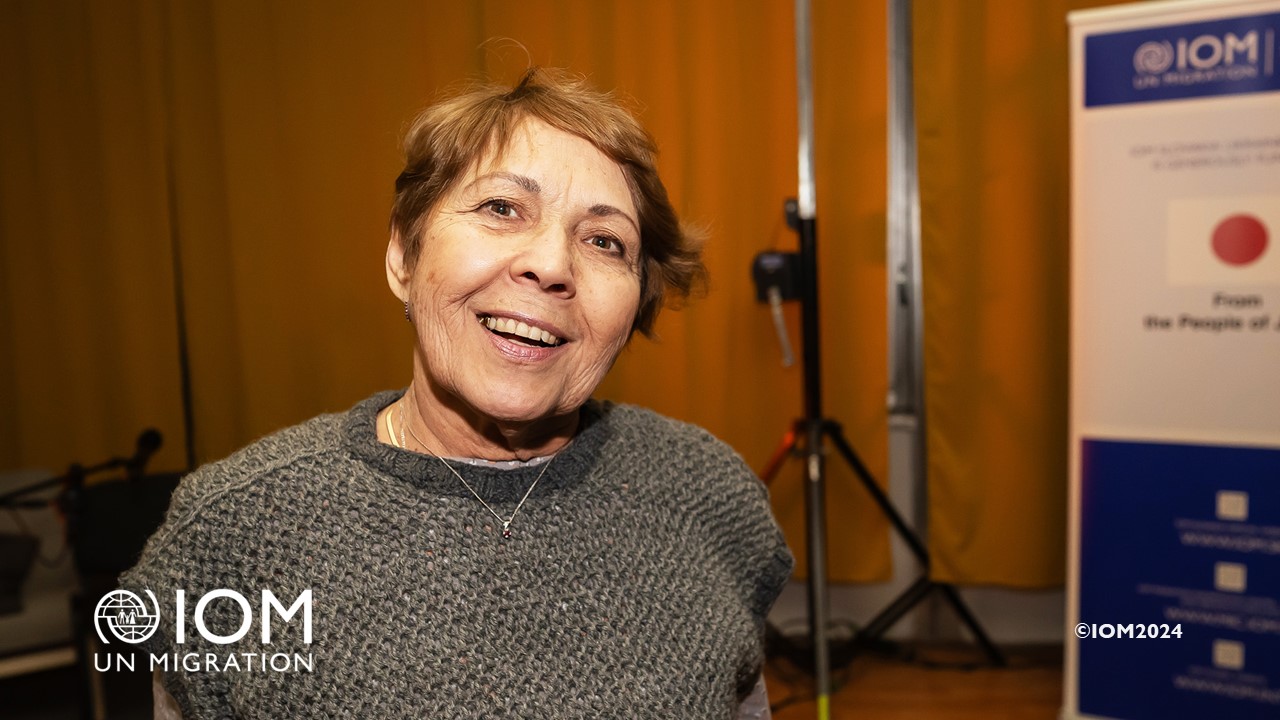
Tetiana is 74 and still full of energy and temperament. Now that her health has improved, she wants to rebuild her dreams. /Photo © VLADIMIR SKUTA PHOTOGRAPHER/
Tetiana visited Kharkiv once when she was 16, and since then, she has never forgotten the beautiful city in north-eastern Ukraine. She graduated in history at Donetsk University in the southeast of Ukraine. She also met her future husband there. One week after they met at Donetsk University for the first time, Piotr knew that Tetiana was his one and only. Together, they started a family in her hometown, Konstyantynivka, an industrial town in the same Donetsk Region. Piotr taught technical work at one of the Konstyantynivka's secondary schools, and young Tetiana later decided to specialize in teaching practical skills and working with different materials. Like her husband, she was manually skilled and found a fondness for creative work like sewing, knitting, embroidering, crocheting, and gardening. Often, she worked on a model in her free time to engage and motivate her students.
"We lived a normal life, and we liked it," says Tetiana, and her eyes sparkled with delight as memories emerged. "It was not an idyllic fairytale", she confesses, "but we were happy, and Piotr was a perfect father." Their children, Dasha and Kateryna, grew up and, to Tetiana's delight, chose to study at universities in her beloved Kharkiv. Elder Dasha followed her love abroad; younger Kateryna stayed in Kharkiv.
As time passed, Tetiana longed to return to Kharkiv, and not only to see her daughter. The city had charmed her once, and she had always wanted to return. Tetiana loved its atmosphere and history, strolling in boulevards, parks, and along the river. At the age of 57, she moved back to Kharkiv with her husband, to fulfil her dream and be closer to her daughter and grandchildren.
After Piotr died in 2017, Tetiana felt she lost her rock, and the joy began to fade from her life. Frequent respiratory illnesses combined with seizures induced by the stress of losing a spouse deteriorated her health, and along with her asthma diagnosis, prescribed medication and oxygen therapy popped in. Although she stabilized later, she remained dependent on the doctor's recommended treatment.
The family led a calm life until 24 February 2022 when explosions, gunfire and lethal drones began to shake the country, homes and everyone in Ukraine. "I did not believe that Russia could invade Ukraine at all," says daughter Kateryna, speaking very good Slovak. As a graduated pharmacist in Ukraine, she first worked in herbal preparations research, where she even became a co-author of one of the patents. At the beginning of February 2022, she had just started a new position in a Ukrainian pharmaceutical company and had completely different life plans.
Hoping that the invasion would soon be over, Tetiana, with her family and friends, spent the first weeks hiding in the basement of their multi-storey block of flats. However, the stress, uncertainty and the cold and damp basement environment made breathing difficult for Tetiana. The last straw was the day the attacks moved from the outskirts of Kharkiv, Saltivka, to the city centre, and a rocket landed in a shopping mall near their home. They left Ukraine on March 11.
Tetiana, her daughter Kateryna, and her two grandchildren packed everything necessary and valuable and headed towards Slovakia. Slovakia was geographically and culturally close to them, and they had heard from acquaintances that Slovakia was a peaceful and safe place. In mid-March they arrived in the Humanitarian Centre in Gabčíkovo in the south of the country.
IOM Slovakia was based in the Humanitarian Centre in Gabčíkovo from the end of March 2022 to the end of March 2024. About 2500 women, men and children, including elderly people and people with disabilities have been accommodated in the facility of 1000 beds since they fled the war in Ukraine. In different time spans, the IOM team provided support in the day-to-day in the Centre, shuttle transport, social, labour and legal counselling, as well as mental health and psychosocial support. The IOM staff also distributed humanitarian assistance, delivered awareness sessions on safe jobs and protection against sexual exploitation and abuse, organized community activities and Slovak language courses.
The hope that the war in Ukraine would end in a couple of days, weeks, perhaps months, and they would soon return home was extinguished and was progressively replaced by the need to organize their lives anew. Kateryna found work in a non-governmental organization based in the Humanitarian Centre, where she was in charge of activities with preschool children. Her children, then 16-year-old Daniel and 9-year-old Mark, enrolled in primary and secondary schools in the area.
The blows of life, especially the stress of war, took their toll on Tetiana. The initial relief supported by the arrival into a safe place with clean air was replaced by several asthma and panic attacks. Tetiana ended up in a hospital in a nearby district town. She was taken under the care of an ambulance installed in the Humanitarian Centre, and having access to her therapy regularly, her condition stabilized.
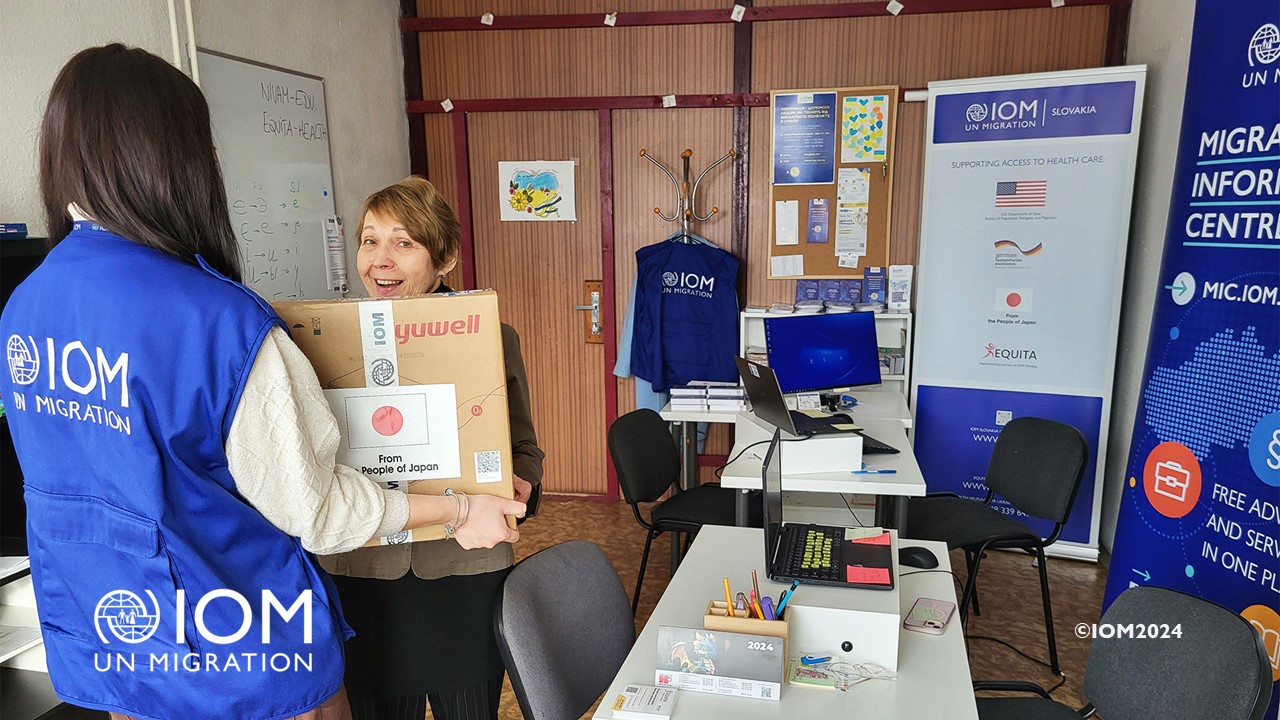
Thanks to IOM Slovakia and its implementation partner Equita, Tetiana was donated an oxygen concentrator based on her asthma history. Buying one herself was impossible, entirely out of her reach. /Photo © International Organization for Migration (IOM) 2024/
Tetiana was coming to the IOM office, where she received assistance through social counselling and support when communicating with medical facilities. Since January2024, Tetiana has visibly not felt well. She confessed that the medical service in the Centre closed and she lacked oxygen. "I was familiar with her health history and understood that she was in urgent need of regular oxygen therapy, which was essential and lifesaving for her", explains Katia, IOM staff in the Humanitarian Centre in Gabčíkovo. IOM Slovakia with expert help of implementing partner Equita donated to Tetiana oxygen concentrator. "Buying an oxygen concentrator was impossible for us, completely out of the realm of fantasy", comments daughter Kateryna, both happy and concerned for her mother.
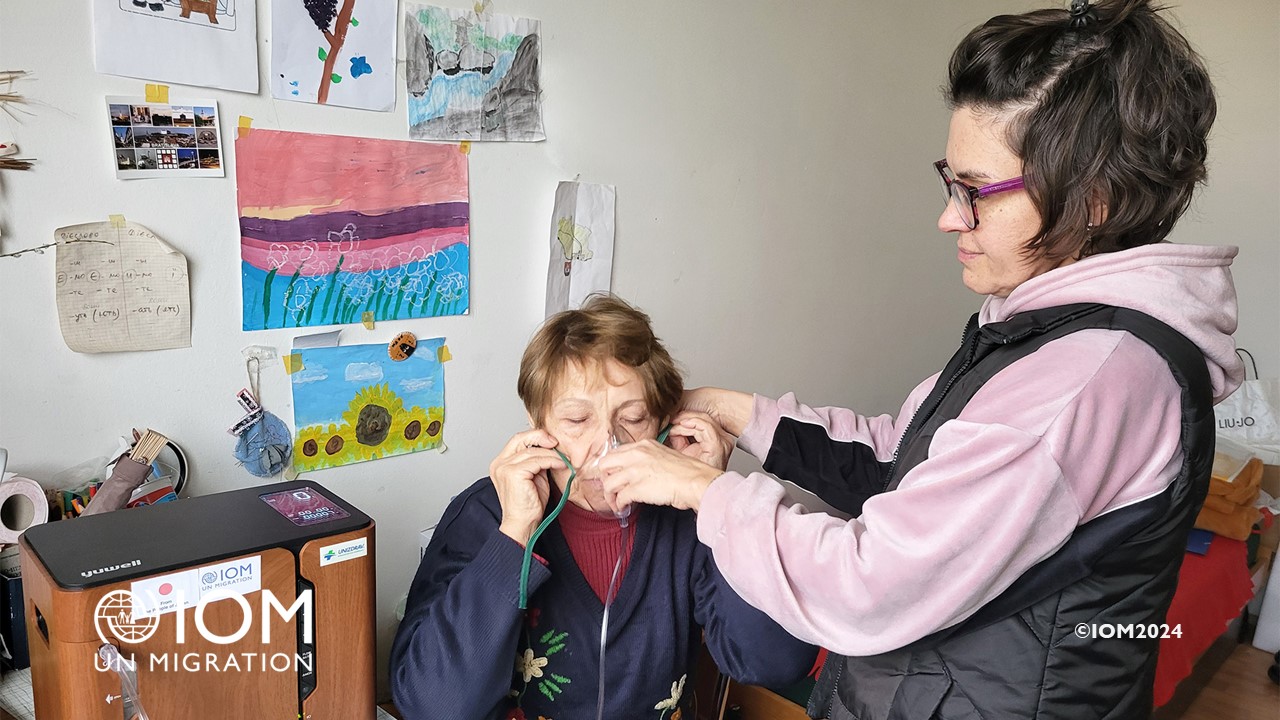
Tetiana can now breathe more freely and does not need to be worried so much about seizures. /Foto © International Organization for Migration (IOM) 2024/
One could never wholly run before the war. It stays present somewhere in the background of everyday life, in the subconscious, in memories which return in flashbacks, in the thoughts of the loved ones left behind, and in the news that always catches up with us, whether one likes it or not. Tetiana felt that she could not stay stranded in the developments caused by the escalation of the international conflict and her escape from it. She made like-minded friends at the Humanitarian Centre, and together, they formed a singing and dancing group. They called it "Nadeja", meaning "Hope", and have already performed at a dozen of concerts in the Humanitarian Centre and the capital city of Bratislava. In February, the IOM team organized a dancing evening for older adults living in the Humanitarian Centre. Tetiana spent a pleasant time in the company of her new friends, coming back to what she used to enjoy.
"It was amazing,” she says, brimming with joy. “It brought me back the memories of how much I and Piotr loved dancing,” she says with nostalgia in her eyes.
The mental health and psychosocial support (MHPSS) programme is integral to IOM's intervention in humanitarian and migration crises. These put significant stress on individuals, families, groups and communities. IOM uses the community-based approach that views emergency-affected people as active participants, encourages recovery and resilience and restores their ability to live fully.
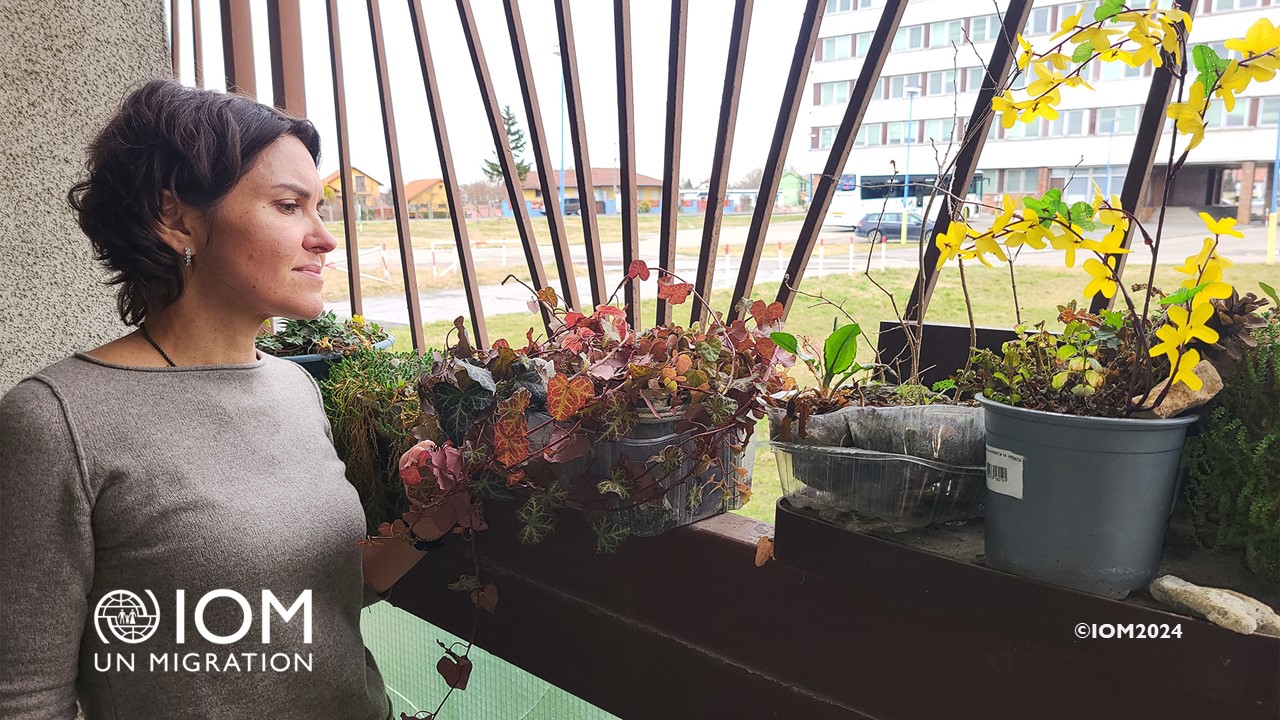
Kateryna is preparing for the supplementary exam in pharmacy and wants to find a job in the field. /Foto © International Organization for Migration (IOM) 2024/
Tetiana's daughter Kateryna enrolled in Slovak language courses organized by IOM in the Centre. Although her work schedule did not allow her to attend all lessons, she gradually switched from her native language to Slovak during the consultations she was coming for at the IOM office in the Centre. Thanks to IOM's support and Kateryna's perseverance, her University diploma was recognized by Slovak authorities, and now she is preparing herself for a supplementary exam. This will allow her to apply for pharmacist positions and start working in her professional field. "It is easier to think about life with a decent job," Kateryna muses. Her new ideals are simple: have housing, a job in her field and children in school.
Today, Tetiana is 74 and still full of energy and temperament. Now, she feels more confident that her health will improve and she can still rebuild her dreams, stolen by the war. To enjoy time with her family and her grandchildren, to connect with her old and new friends and to do the things she enjoyed and was passionate about. "Now I can breathe more freely, and I do not have to worry so much about seizures.” Tetiana says she needs to be active and open up to the world again. She wants to breathe in new life.
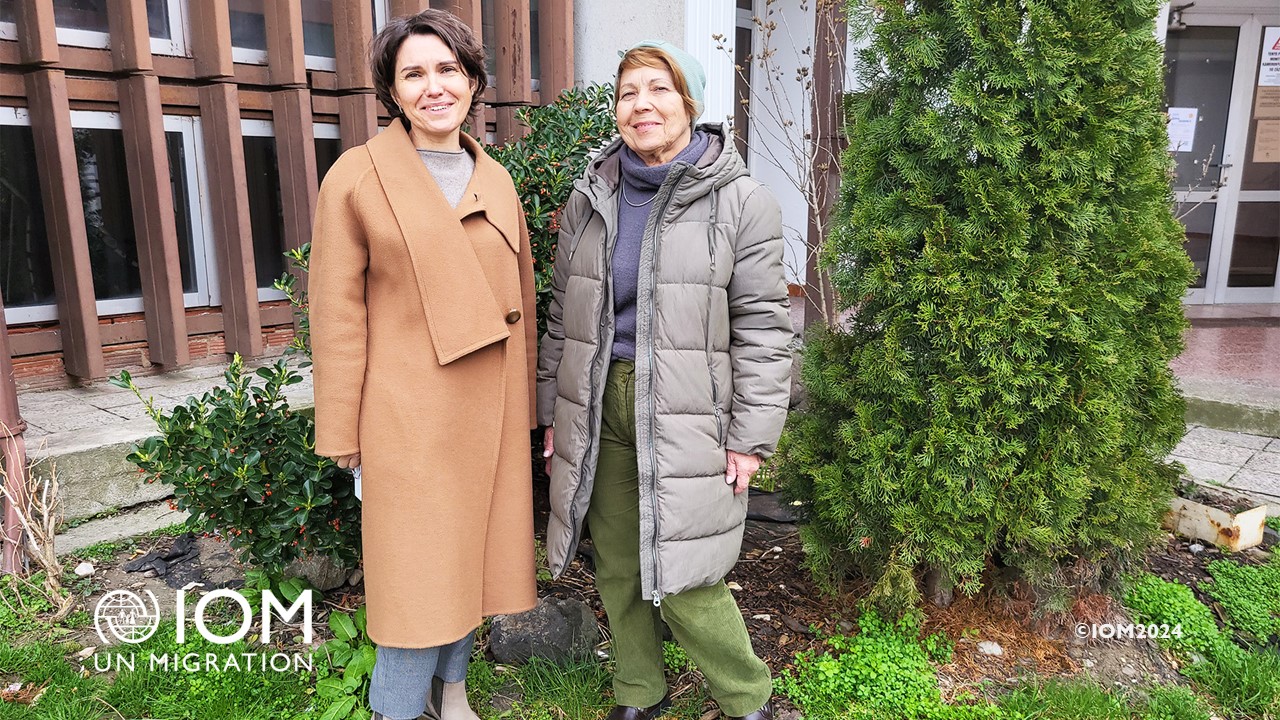
Kateryna dreams of a pharmacist job, and Tetiana wants to enjoy time with her family and friends. /Foto © International Organization for Migration (IOM) 2024/
TEXT: Jana HONSCHOVA
PHOTO: VLADIMIR SKUTA PHOTOGRAPHER, © International Organization for Migration (IOM) 2024
With the generous support of:

 Slovenčina
Slovenčina
 Українська (Україна)
Українська (Україна)
 English
English
